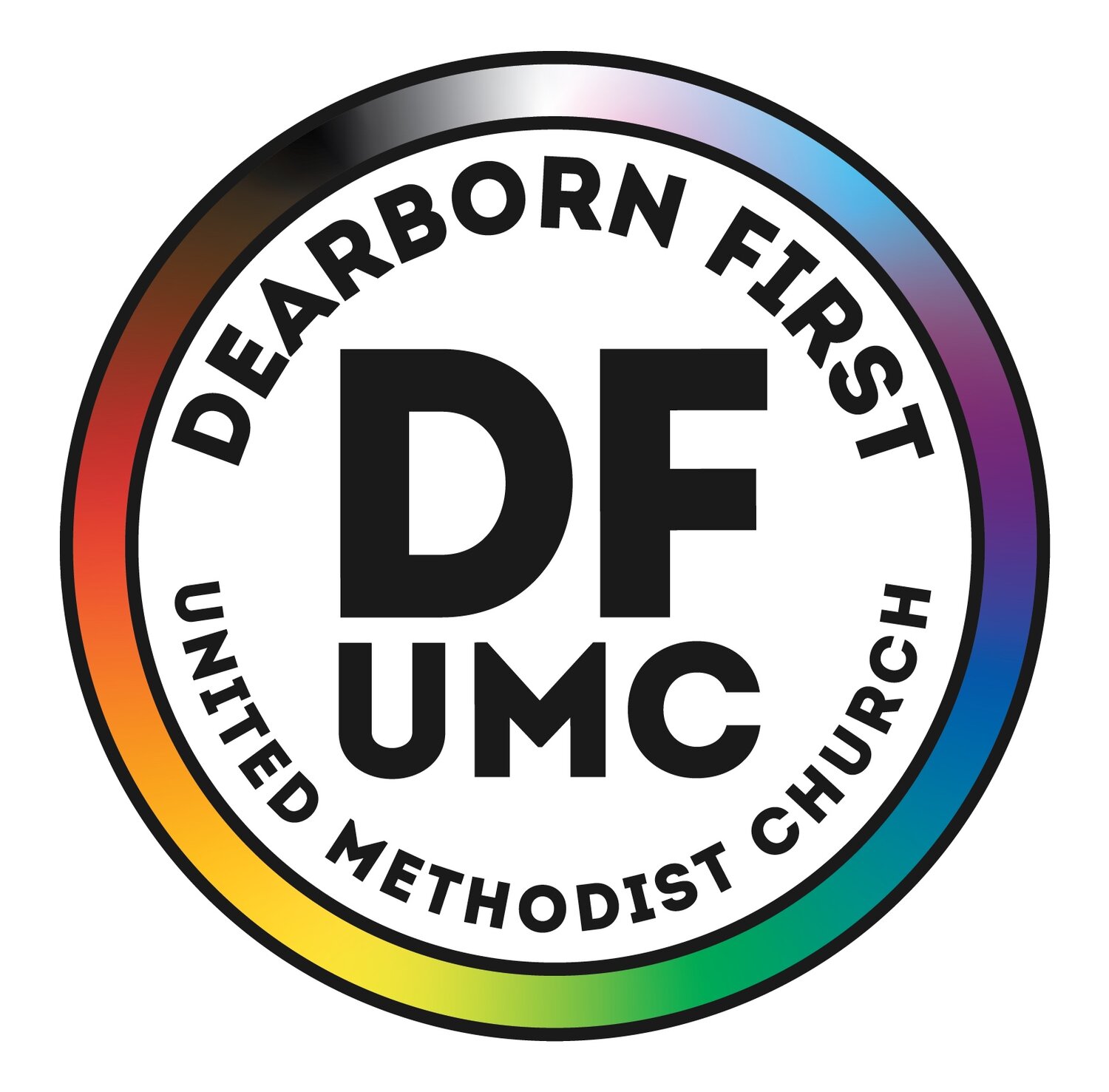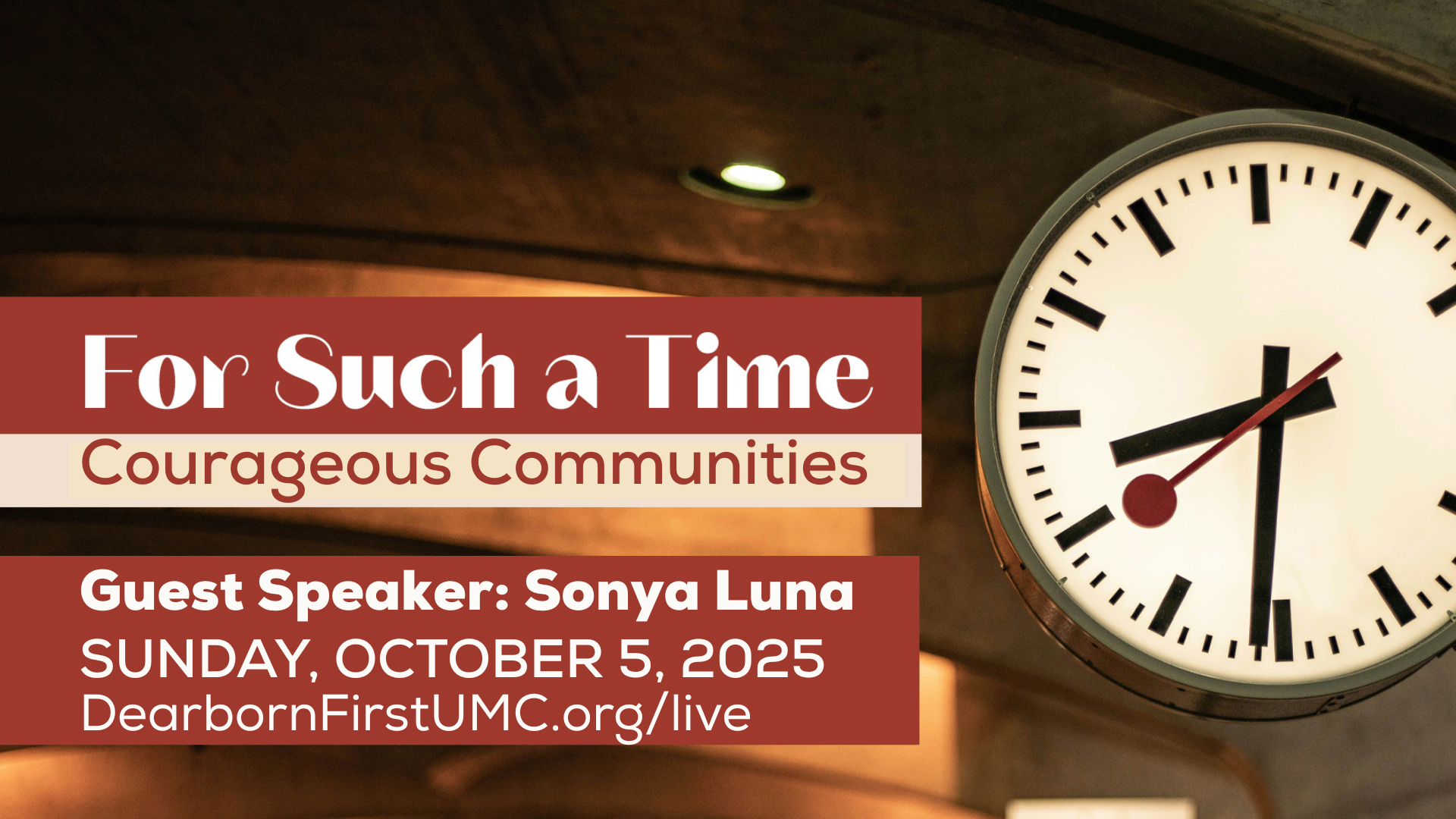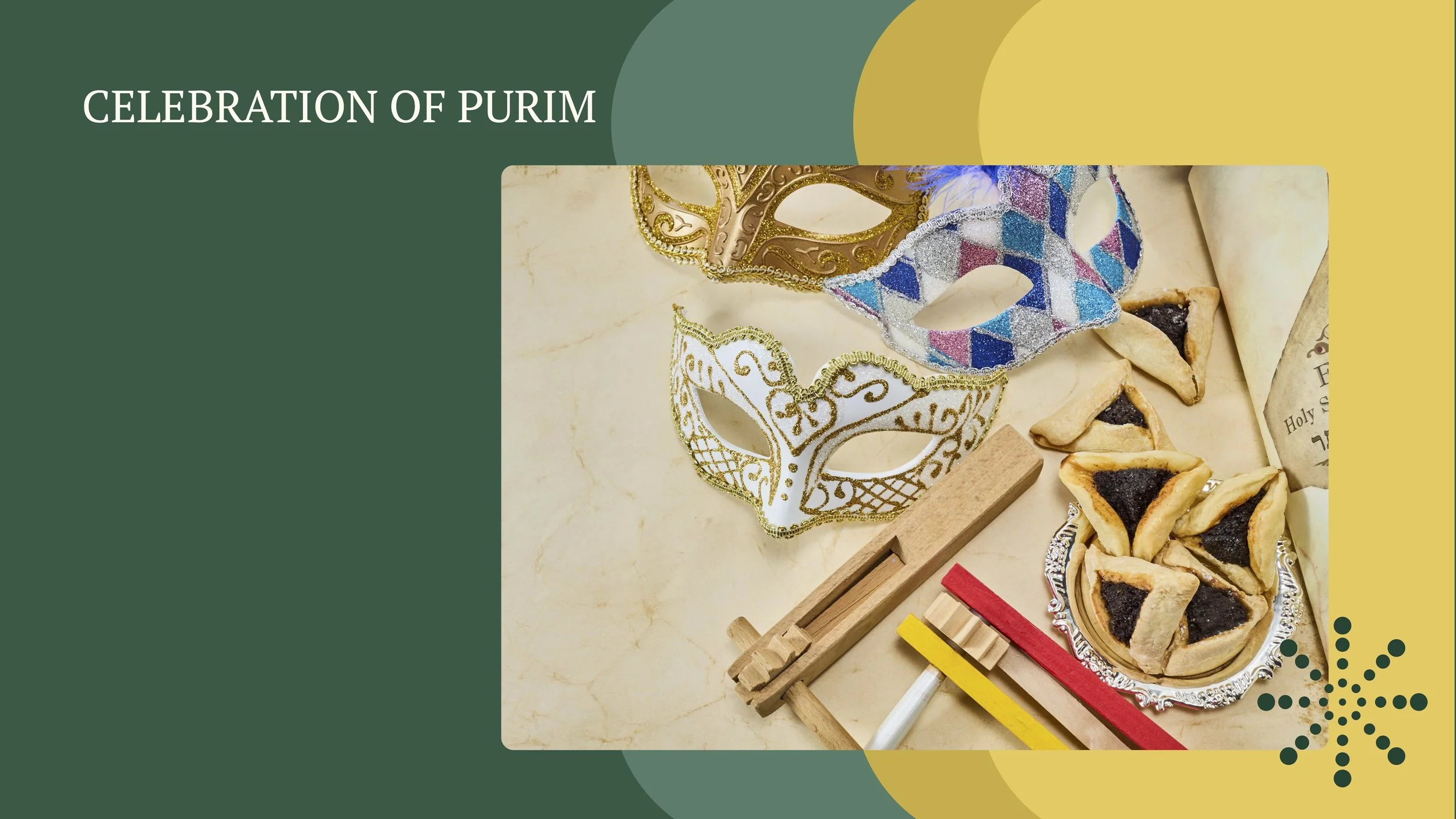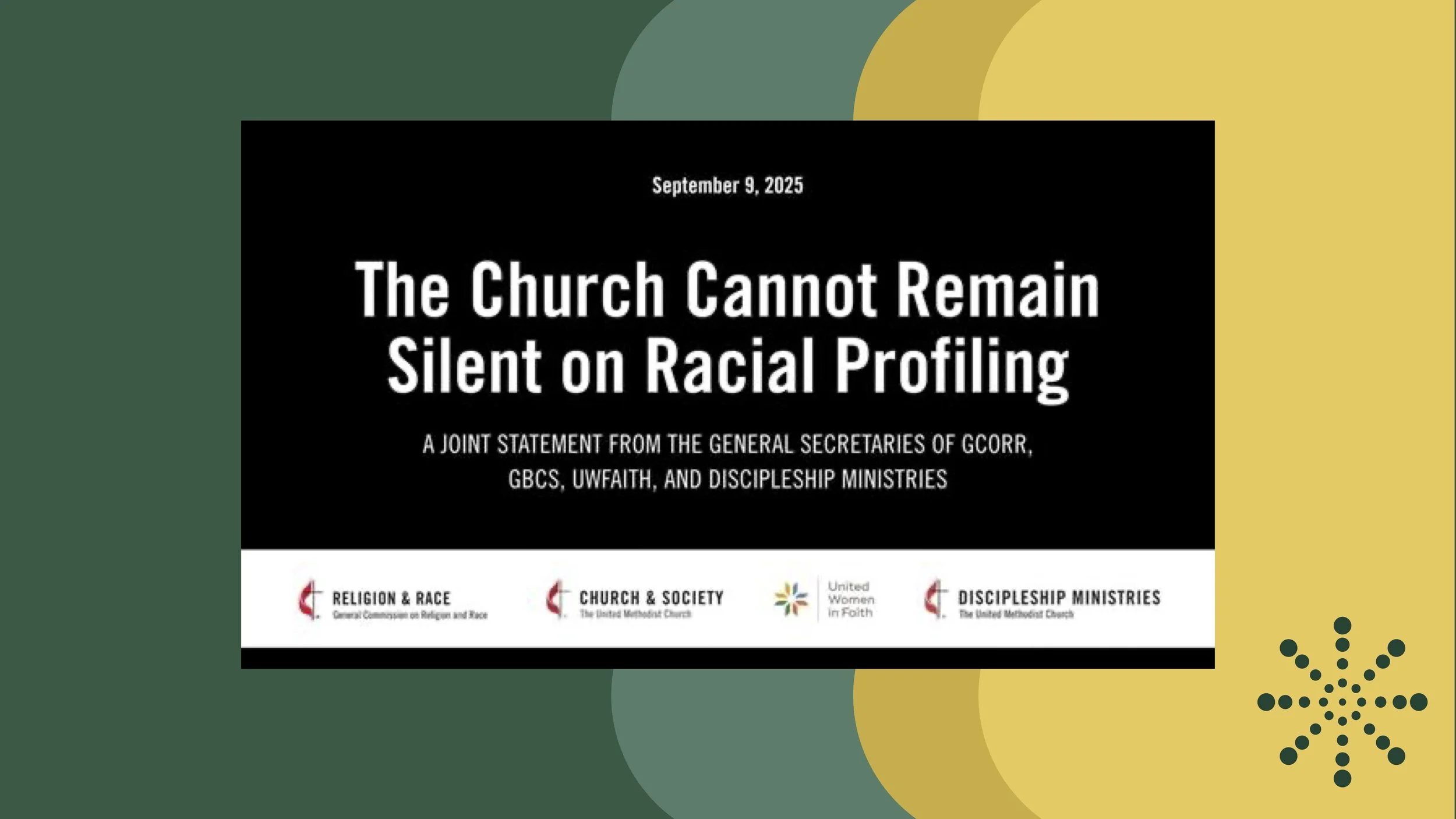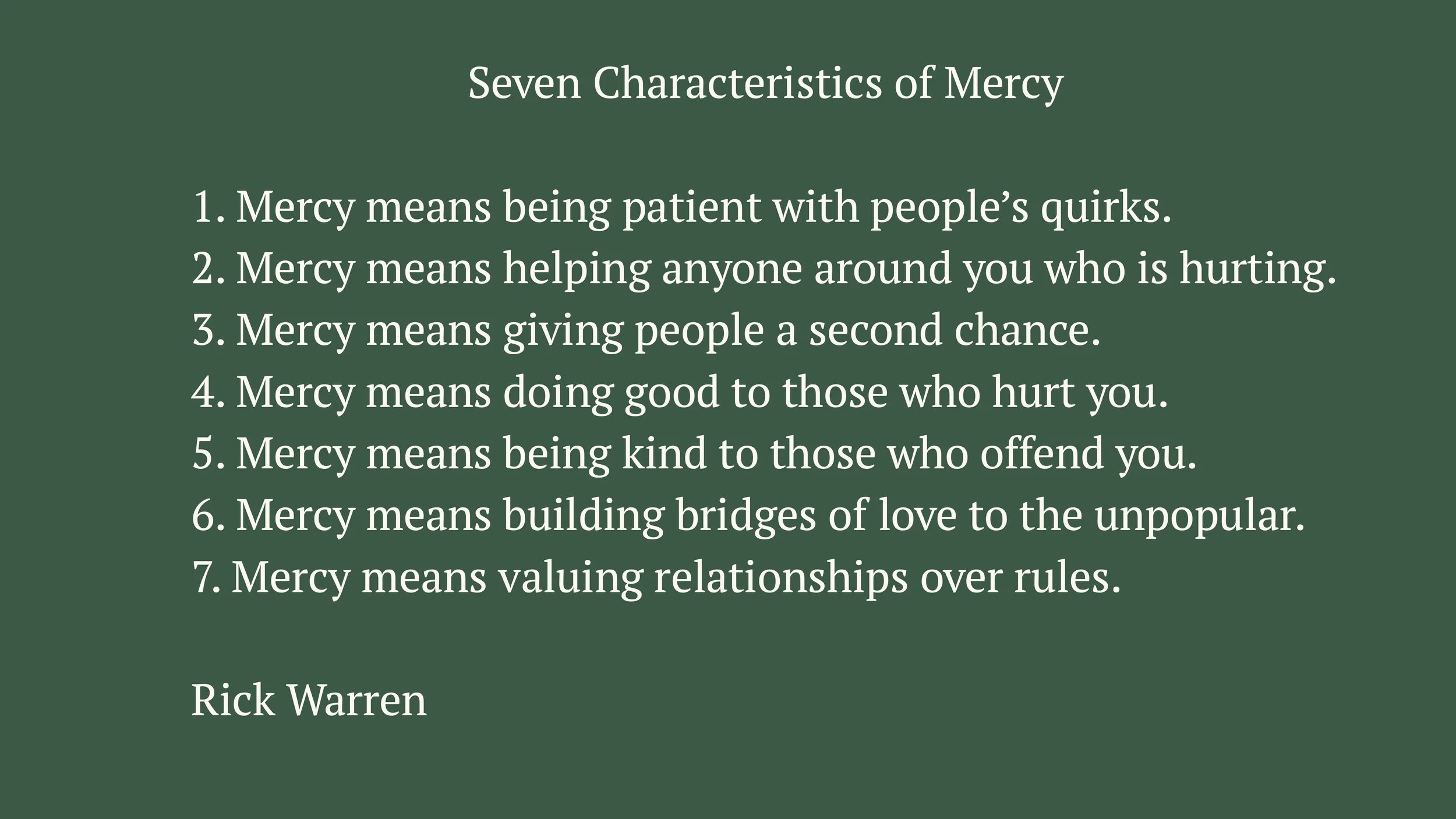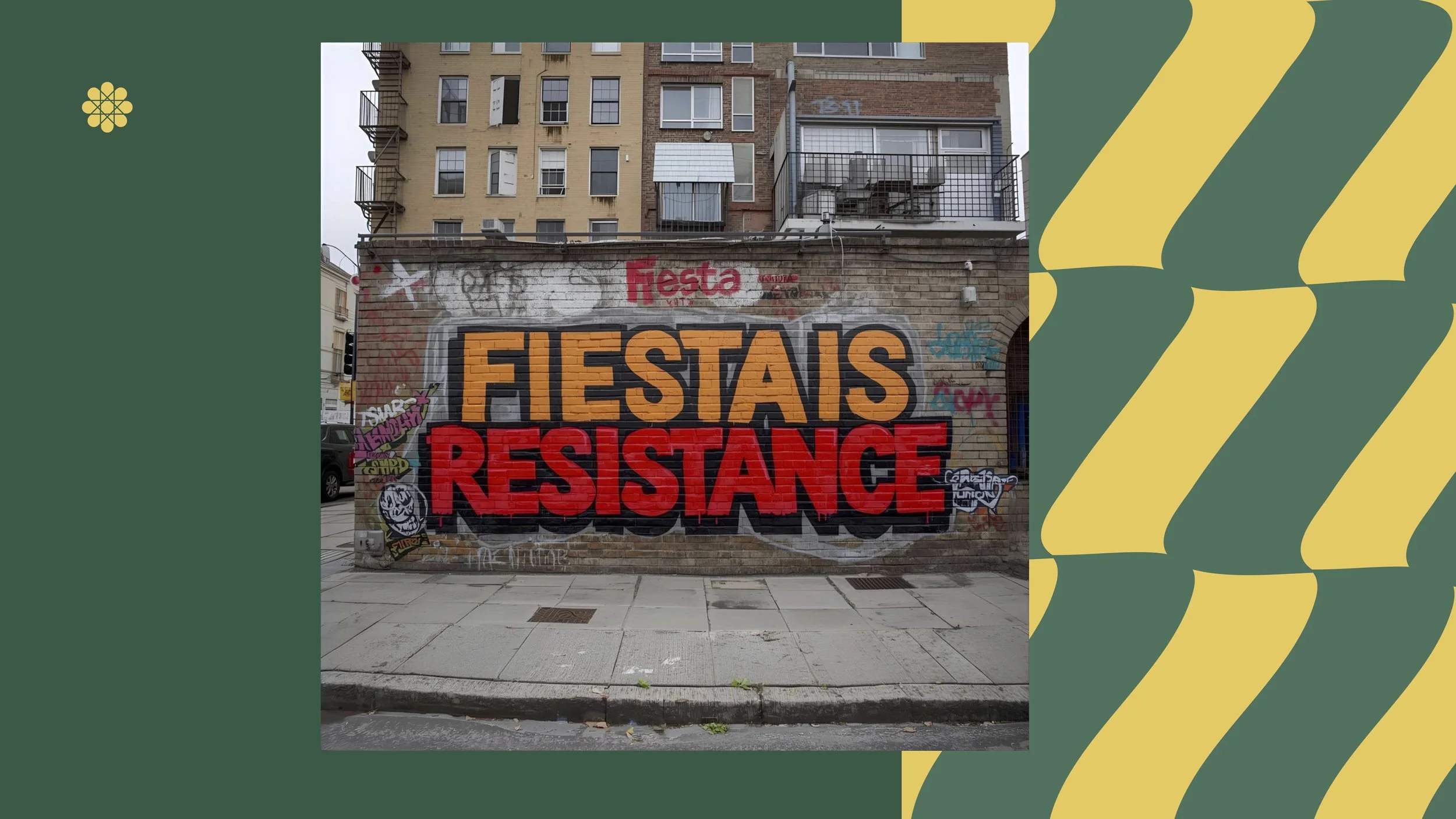For Such a Time: Courageous Communities
by Sonya Luna, Guest Speaker
October 5, 2025
SCRIPTURE:
Esther 4:14
Esther 7:2-6
Esther 9:24-32 31
Based on the series “Uncommon Wisdom” by UMC Discipleship Ministries
Esther: the Queen
When I grew up I have to confess that I watched Soap Operas. I was a latch-key kid, meaning when I was old enough I would walk home from school and I had my own key to the house and I would be home by myself until my parents came home from work. I would of course watch soap operas. General Hospital was my favorite one. I also watched telenovelas when I lived in Mexico. Telenovelas (literally translated as television novels) are soap operas, but way more dramatic. I found that watching telenovelas helped me to learn Spanish, the diction was excellent and the drama helped me to know what was going on.
I feel like the book of Esther plays out like a soap opera or telenovela.
You might know Esther from Mordoeci’s line to Esther, Esther 4:14:
For if you remain silent at this time, relief and deliverance for the Jews will arise from another place, but you and your father’s family will perish. And who knows but that you have come to your royal position for such a time as this?
“Such a Time As This” was even the theme of the Michigan Annual Conference in 2019 and that was before the pandemic and the current political situation. Now this theme is important and we are going to touch on that theme a little today and we are also going to look at the actions of Esther, the King, and the Jewish community. I would encourage you to read the whole book of Esther. It is a short book and full of drama, like a soap opera.
Esther and Uncommon Wisdom
While you might not glean much wisdom from soap operas, Esther is considered to be part of the wisdom books in the Bible. Today you are ending your sermon series on uncommon wisdom. As a reminder the sermon series was named “Uncommon Wisdom” because quoting from the worship planning notes, “We’ve called it “Uncommon Wisdom” because we feel that these scripture lessons invite us to a less popular and underappreciated way of using scripture to look at the world around us. In a society whose only real success strategies appear to be exploitation, violence, and smear campaigns, these verses will show us another path to the good life- a road less traveled. These passages might comfort or challenge us in strange ways that we haven’t necessarily come to expect from biblical texts.” (Hancock)
Uncommon wisdom comes from the word of God, while interesting enough the book of Esther never mentions God. But we know that God was present with Esther and Mordeci and the king and the Jewish people during their challenging time.
Esther: A Queen’s Beauty
To better understand what was going on before these verses we read, I am going to briefly sum up the book of Esther, and again it might sound a little like a soap opera.
There was a King named King Ahasu-e′rus. He was the Persian king. The King liked to party a lot. He held a banquet for 180 days and then held another banquet in the palace for seven days showing off his finest decorations and place setting. On the last day of the banquet the King wanted to show off Queen Vashti’s beauty to the guests at the banquet in the palace, but the queen refused to come. The King gets angry and after meeting with his sages, announces that Queen Vashti will no longer be the queen and that he is going to look for another queen to replace her.
In order to find another queen, the King asks to have a beauty contest of sorts to choose the next queen. Mordecai is a Jewish man that works at the palace's gate. Moredcai convinces Esther, his cousin, whom he adopted as his daughter after her parents died, to take part in the beauty contest. Esther, a Jewish woman, wins the contest and becomes the new queen all while hiding the fact that she is Jewish. The King has a banquet for Queen Esther.
At the King’s gate Mordecai overhears a plot to kill the King and Mordecai tells Esther about the plot. Queen Esther then warns the King by telling him what Mordecai heard. Mordecai saves the King’s life and this act is documented in the royal annual court papers.
Esther: A Queen’s Courage
The King then promotes Haman as the highest official that sits next to the King. It is ordered that everyone has to bow down to Haman. All the King’s servants bowed down to Haman except Mordecai, so Haman got upset and asked the King to not only kill Mordecai but all of the Jews in the kingdom. Haman convinces the King to put out a decree for that to take place.
Mordecai asks Queen Esther to speak to the King and to stop the decree, but no one is allowed to speak to the King unless invited to by the King himself. This is when Moredcai says the words
“For if you keep silence at such a time as this, relief and deliverance will rise for the Jews from another quarter, but you and your family will perish. Who knows? Perhaps you have come to royal dignity for just a such a time as this.” Esther 4:14
Esther risks her life to speak to the King and invites him and Hamam to two banquets.
Before the second banquet the King is bored and wants to read the royal annual court papers and remembers that Mordecai saved his life. He takes that memory with him to the banquet.
At the banquet Haman still wants to have Mordecai killed, but Queen Esther asks the King to save the Jews and to stop the decree as we heard in our scripture reading. I am going to read it again. This is from the King James Version, Esther 7:2-6:
2 What is thy petition, queen Esther? and it shall be granted thee: and what is thy request? and it shall be performed, even to the half of the kingdom.
3 Then Esther the queen answered and said, If I have found favour in thy sight, O king, and if it please the king, let my life be given me at my petition, and my people at my request:
4 For we are sold, I and my people, to be destroyed, to be slain, and to perish. But if we had been sold for bondmen and bondwomen, I had held my tongue, although the enemy could not countervail the king's damage.
5 Then the king Ahasuerus answered and said unto Esther the queen, Who is he, and where is he, that durst presume in his heart to do so?
6 And Esther said, The adversary and enemy is this wicked Haman. Then Haman was afraid before the king and the queen.
As we hear in the scripture reading: The King is persuaded by Queen Esther’s request and he orders Haman to be killed instead of Mordeci. However the decree has already gone out to kill the Jewish community, so the King says that the Jews can fight in their defense and fight for their survival.
Esther: The Celebration of Purim
Word gets out about Mordecai and he becomes powerful and famous and the Jewish people fight and destroy their enemies. And then as we read in the scripture reading, the Jewish community comes together to celebrate. The celebration is known as Purim. The Purim tradition is explained in more detail in Esther 9:24-32 which states:
Revised Standard Version Esther 9:24-32
24 For Haman the Ag′agite, the son of Hammeda′tha, the enemy of all the Jews, had plotted against the Jews to destroy them, and had cast Pur, that is the lot, to crush and destroy them; 25 but when Esther came before the king, he gave orders in writing that his wicked plot which he had devised against the Jews should come upon his own head, and that he and his sons should be hanged on the gallows. 26 Therefore they called these days Purim, after the term Pur. And therefore, because of all that was written in this letter, and of what they had faced in this matter, and of what had befallen them, 27 the Jews ordained and took it upon themselves and their descendants and all who joined them, that without fail they would keep these two days according to what was written and at the time appointed every year, 28 that these days should be remembered and kept throughout every generation, in every family, province, and city, and that these days of Purim should never fall into disuse among the Jews, nor should the commemoration of these days cease among their descendants. 29 Then Queen Esther, the daughter of Ab′ihail, and Mor′decai the Jew gave full written authority, confirming this second letter about Purim.
30 Letters were sent to all the Jews, to the hundred and twenty-seven provinces of the kingdom of Ahasu-e′rus, in words of peace and truth, 31 that these days of Purim should be observed at their appointed seasons, as Mor′decai the Jew and Queen Esther enjoined upon the Jews, and as they had laid down for themselves and for their descendants, with regard to their fasts and their lamenting. 32 The command of Queen Esther fixed these practices of Purim, and it was recorded in writing.
Esther: The Courage to Speak the Truth
So, now that you know the story of Esther, the days of our lives of Esther, and the Jewish tradition of the Purim. What stands out to me the most is the courageousness of Esther. Esther spoke truth to the King all while hiding the fact that she was Jewish and the fact that it was dangerous to speak truth to the King.
Rev. Eric Law in his book Holy Currencies: 6 Blessings for Sustainable Missional Ministries, identifies one of the six currencies as the currency of truth.
Rev. Eric Law describes the currency of truth as:
“the ability to articulate individually and corporately the global and wholistic truth, internally (the experiences of the different individuals and groups within the church or ministry) and externally (the experiences of the different individuals and groups in the community, the neighborhood, the city or town, the nation, and the earth).” (Law 48).
Esther learned the truth about her Jewish community and told that truth to the King. What makes Esther’s act so courageous is that she told the truth and she also spoke truth to power. Speaking truth to power is uncommon wisdom.
Recently, I have witnessed courageous people and groups speaking truth to power. I have witnessed the United Methodist Commission on Religion and Race put out a statement about the Supreme Court ruling concerning an Immigration Customs and Enforcement policy. The first part of the statement says:
“The gospel of Jesus Christ calls us to name and resist the powers of evil that harm our communities. The Church is a living mosaic of God’s creation—expressed in the beauty of diverse languages, cultures, ethnicities, abilities, genders, and more. Each is a sacred gift of God to the world. When any part of God’s divine image is demeaned because of language, accent, skin color, or difference from white dominant culture, we cannot remain silent. With deep concern for our neighbors, we must name the recent Supreme Court decision in Noem v. Perdomo (issued September 8, 2025), which lifted a restraining order that had prohibited ICE agents from stopping or detaining individuals in Los Angeles solely on the basis of four factors—apparent race or ethnicity, speaking Spanish or English with an accent, work location (e.g., day-labor sites), or type of work (e.g., low-wage labor). This ruling is not simply a matter of policy; it grants license for racial profiling. It sanctifies discrimination. It weaponizes our God-given Imago Dei as a tool for exclusion and erasure.” (General Commission on Religion and Race et al.)
The Commission on Religion and Race took a courageous step to speak out against the ruling and as they stated not to remain silent. They could not remain silent.
What makes Esther’s act even more courageous is that she is a woman. Speaking truth to power as a woman is even more dangerous. Remember how the queen before Esther was ousted because she did not follow the commands of the King. I have also witnessed women speaking truth to power. In a video, I saw the wife of an immigrant man that was going to be detained by ICE outside of court and the wife stood tall and said, if you take him, then you are going to have to take all of us, me and the kids too. Their kids were with them too. She kept repeating, if you take him, you need to take all of us. We are going together as a family. ICE ended up not taking any of them, and the father and his daughter embraced in the elevator on the way out of the court. I have seen many videos where people are trying to hold ICE accountable.
Another group of women that I have seen speak truth to power in creative ways is called the Raging Grannies. You might have heard about them because they actually started in Victoria, British Columbia in 1987. I am going to read you some of their philosophy. “Grannies are best equipped to make public, corrupt things that have been hidden (often for profit). Local toxic waste sites that no-one seems prepared to tackle, asbestos sites employing young people desperate for work, nuclear waste products being dumped outside an uninformed small town, laws that affect an entire community, passed quickly with no opportunity for study. The list goes on.
Grannies always check their facts before acting, discarding rumours, conspiracy theories and the agendas of others. They wait patiently till the whole picture is clear before hitting the street with their pointed, original and devastating songs, written by any old gran who feels inspired.
The delights of grannying include: dressing like innocent little old ladies so we can get close to our ‘target’, writing songs from old favourites that skewer modern wrongs, satirizing evil-doing in public and getting everyone singing about it, watching a wrong back down and turn tail and run, sharing a history with other women who know who they are and what they’re about. Grannying is the least understood yet most powerful weapon we have. Sometimes, looking back, we can see grannying was the only thing that could have met the need.” (DeShaw)
The Raging Grannies are continuing to creatively protest today around topics such as immigration. The Raging Grannies and others are following the uncommon wisdom that we can glean from Esther to speak truth to power.
Esther: The Uncommon Wisdom of Mercy
Another uncommon wisdom that we can learn from the story of Esther is mercy.
“The wisdom from above is first of all pure. It is also peace loving, gentle at all times, and willing to yield to others. It is full of mercy.” James 3:17 (NLT)
We saw the King having mercy on the Jewish community as well as having mercy on Mordecai and Esther. Mercy is something that we do not see very often these days especially in the online virtual world with cyberbullying and the likes. People can not do anything wrong or right because there are always going to be online haters.
I have seen that with an athlete I follow online, an elite men’s road cyclist from Mexico, Issac del Toro. Ever since he lost the Tour of Italy, basically the Tour of France, but in Italy, he has had online haters leaving him terrible comments. There is no mercy. Another example from the popular Netflix's show Cobra Kai (Karate Kid spin off), where the motto of Cobra Kai Karate studio was No Mercy. Showing mercy is uncommon these days.
I like what Rick Warren says about mercy. He has identified seven characteristics of mercy:
1. Mercy means being patient with people’s quirks.
2. Mercy means helping anyone around you who is hurting.
3. Mercy means giving people a second chance.
4. Mercy means doing good to those who hurt you.
5. Mercy means being kind to those who offend you.
6. Mercy means building bridges of love to the unpopular.
7. Mercy means valuing relationships over rules. (Warren)
I like these characteristics of mercy, because sometimes the concept of mercy seems too abstract and hard to understand. It is more than just forgiveness. These characteristics also help you to build relationships and a community.
Esther: the Uncommon Wisdom of Gratitude and Celebration
One last uncommon wisdom that you can glean from the story of Esther is gratitude and celebration. The Jewish community was grateful for having the opportunity to fight off their adversaries and they created a celebration to be celebrated every year. It seems foolish to celebrate in challenging times, but it reminds us of all that we have. I recently learned about the idea that Fiesta is Resistance, Partying is Resistance. This idea is from a sermon written by Rev. Dr. Lydia Munoz.
Jonathan Cintrón-Rodz wrote a piece reflecting on this idea. His piece is based on Psalm 137:4.
He states, “How can we sing the song of freedom in a foreign land?
What we have learned from our own experience is that here in the exile, in the margins, there is always music, there is always dancing and through the Fiesta we have found a way to keep our heads up, our people smiling, our people dancing. Through the stomping of our feet, we keep making the structures of evil shake and the corrupted governments tremble. Our people can sing even when our hearts are broken, because our hope for freedom never ends.” (Cintrón-Rodz)
Recently on NPR, I heard about these events called Coffeeton, which combines Coffee and Reggaeton (a type of Latin Dance Music). You might become more familiar with Reggaeton after Bad Bunny performs at the Super Bowl, halftime show. Coffeetons are early hour dance parties that are held at coffee shops. This is what was said from two people that have attended these dance parties in Seattle, Washington, in a recent NPR story:
MONARES: York says Latinos need a place to celebrate and find community right now as the Trump administration's immigration enforcement actions have caused anxiety.
YORK: You know, like, with the current situation of, like, our community, people are worried, people are scared. So they found, like, Coffeeton as, like, a place to forget problems, to just have fun, to connect with your culture. (Monares)
Finding time to celebrate is important even in difficult times.
In doing research for this sermon, it was mentioned that Esther reminds us that not only should we look for uncommon wisdom, but we should also act on it. The sermon notes state:
Esther: The Uncommon Wisdom of Reflection and Action
We learn from Esther that God’s uncommon wisdom demands reflection and action. Consider, too, how Esther’s story illustrates what wisdom calls us to do—to act with courage, to demand justice, to advocate for accountability.
Where in your neighborhood do you need courageous voices to speak?
Where do your neighbors need the church to show up and demand justice?
Where does your church need to hold itself accountable for past and present injustices?
Wisdom persistently knocks at our door with these questions and more. (Hancock)
Building Courageous Communities
I am working on a project with the Michigan Conference called Courageous Communities. This project supports local churches that want to create courageous communities with immigrants. Dearborn First UMC is actually an example of a Courageous Community, having been in ministry with immigrants for many years. For more than a decade and a half Dearborn First UMC has hosted and supported Immigration Law and Justice- Michigan offices and law clinics. I am grateful that you continue to do this work, as I am still serving on the Board of Directors for Immigration Law and Justice-Michigan. It is wonderful to see how much you have dedicated to this work. You have also received a Mustard Seed grant and are supporting immigrant families in your community. Your welcome statement itself also indicates that your church is a courageous community.
For such a time as this there is need to put the uncommon wisdom into action. Now is the time. There is so much going on right now and things are so hard. Many communities, not just the immigrant community are under attack. Sometimes it feels so overwhelming and we do not know what to do. The story of Esther and Moredaci and the Jewish community gives us some uncommon wisdom on how we should respond. So, in this current day how might your church speak truth to power? How can your church show mercy? How can your church celebrate and show gratitude? How might your church continue to build and strengthen your courageous community?
My Wesley Study Bible says this in the introduction to the book of Esther, that “Although God is never mentioned, as Wesley notes, the “finger of God” directs events. Behind the events, with their dramatic plot reversals, stands not just a divine order but also a divine ordering. The audience is meant to see that such divine ordering of life calls not for a fatalistic submission to some pre-orchestrated plan, but for personal willingness to act faithfully in response to divine opportunities.” (Willimon 601)
Let’s continue to act on uncommon wisdom and respond to divine opportunities so that we can create courageous communities. And then let’s party and celebrate, showing our gratitude that God is always present.
Let us pray.
For such a time as this, where everything feels so overwhelming and we do not know what to do. Help us to be courageous, speak truth to power, have mercy, and be grateful that God is always present. Help us to respond to the divine opportunities and help us to create more courageous communities. Mil Gracias, Dios. Thank you God for your uncommon wisdom.
Works Cited
Cintrón-Rodz, Jonathan. “Fiesta is Resistance.” https://enfleshed.com/, 2019, https://enfleshed.com/blogs/moments-for-common-nourishment/fiesta-is-resistance/. Accessed 30 September 2025.
DeShaw, Rose. “Philosophy.” Raging Grannies International – Welcome to the International Raging Grannies website!, 1987, https://raginggrannies.org/. Accessed 30 September 2025.
General Commission on Religion and Race, et al. “Joint Statement: The Church Cannot Remain Silent on Racial Profiling.” https://www.gcorr.org/, 2025, https://www.gcorr.org/news/joint-statement-the-church-cannot-remain-silent-on-racial-profiling. Accessed 30 September 2025.
Hancock, Lisa. “The Time of Singing Has Come Uncommon Wisdom Fifteenth Sunday after Pentecost, Year B.” https://www.umcdiscipleship.org/, 2024, https://www.umcdiscipleship.org/worship-planning/uncommon-wisdom/fifteenth-sunday-after-pentecost-year-b-lectionary-planning-notes. Accessed 30 September 2025.
Law, Eric H F. Holy Currencies: Six Blessings for Sustainable Missional Ministries. Chalice Press, 2013.
Monares, Freddy. “Coffee-fueled dance parties give Seattle's Latino community a place to connect.” NPR, 5 September 2025, https://www.npr.org/2025/09/05/nx-s1-5526054/coffee-fueled-dance-parties-give-seattles-latino-community-a-place-to-connect. Accessed 30 September 2025.
Warren, Rick. “Seven Characteristics of Mercy - Jun 15, 2023 - Pastor Rick Warren.” Lightsource, 2025, https://www.lightsource.com/ministry/daily-hope/articles/seven-characteristics-of-mercy-19207.html. Accessed 30 September 2025.
Willimon, William H. The Wesley Study Bible: New Revised Standard Version. Edited by Joel B. Green and William H. Willimon, Abingdon Press, 2009.
Benediction Prayer
Our Lord and our God, we thank you on this day for the many ways that you have been present. We thank you for the days that some Esther interceded for us without our knowing it. Grandma Esther, Aunt Esther, or maybe even Uncle Esther worked in secret for our good, often risking jobs, reputation, or substance to give us a chance for life.
We thank you, O God, for making a way out of no way. We pray for anyone who feels like he or she is drowning in grief, despair, fear or in suffering today. Help that person to know that your promises are sure and that you are ever-present. Lift all of our heads above the raging waters and show us the dry ground on the horizon ahead.
Strengthen us as we pray for this week’s journey. Help us make the next right step. Make us mindful of the weak and the weary and teach us how to bear one another’s burdens along the way. Show us mercy and may we have mercy on others. Help us to speak truth to power and to be courageous. Remind us that we are a family of faith. And help us look for ways to celebrate along the way. We ask this in Jesus’ name. Amen.
Adapted from Safiyah Fosua, The Africana Worship Book, Year B (Nashville: Discipleship Resources, 2007), 144.
About Sonya:
Sonya Luna is from Ypsilanti, Michigan, where she currently lives with her family. She has 20 years of experience working with the United Methodist Church, both at the local church level and at the conference level. She was the Coordinator of Hispanic/Latino Ministries for 15 years for the Michigan Conference. She now works as the Christian Life Coordinator at Dearborn Good Shepherd United Methodist Church. She runs her own consulting, coaching and art business called Sonya Luna Creative Studios. She also works for Strangers No Longer as an administrator. She is an empathic leader that advocates for diversity, inclusion, and equity. She was one of the founders of what was known as Justice for Our Neighbors-Southeastern Michigan and is now Immigration Law and Justice-Michigan. She currently serves on the statewide Board of Directors for Immigration Law and Justice. She has many interests including reading, jigsaw puzzles, and cycling. She is also an artist who loves creating. She is grateful to Dearborn First United Methodist Church because she took a quilting class at the church about 10 years ago where she discovered her love for quilting and fiber/textile arts.
